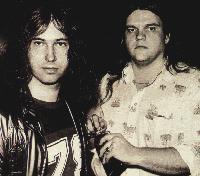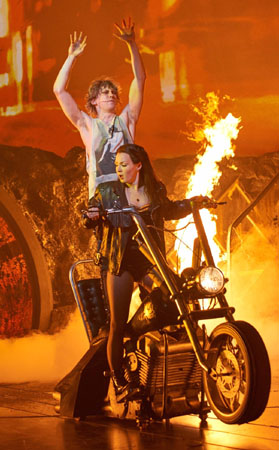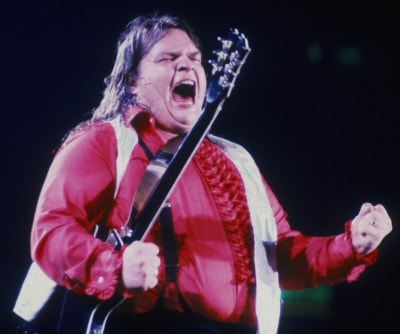Rock's 'Freaky' Opera Rides Again
By David Quantick
Daily Telegraph
It's camp, ridiculous - and now a West End musical. David Quantick explains his love for Meat Loaf's Bat Out Of Hell.

On stage, dripping with sweat, a young man is singing his heart out - and his eyes too, judging by the way they bulge with every high note. The song is the title track of an album called Bat Out Of Hell.
I swear I saw a young boy, down in the gutter", the singer declares. "He was starting to foam in the heat…" Borne along by screaming guitars and enthusiastic backing singers, the performer hits the chorus and the entire audience erupts. "LIKE A BADDOUDA HELL I'LL BE GONE WHEN THE MORNING COMES!"
It's an explosion of pure excitement and unrestrained glee. But this is not a scene from 1977, and the singer is not Meat Loaf. Bat Out Of Hell, one of the biggest-selling rock albums or all time, has been turned into a musical and, after a successful run last summer at London's Coliseum, the production is now taking up residence at the Dominion Theatre.
Theatregoers looking for sex, bike leathers and bombastic rock music will not be disappointed. The pyrotechnic-heavy show, which won Best Musical at the Evening Standard Theatre Awards last year, is set in a dystopian future and tells the tale of Raven, an 18-year-old with rich, controlling parents, who risks everything to be with Strat, the leader of a gang of outcasts. Over nearly three hours, the cast performs the memorable tracks from the original album - You Took The Words Right Out Of My Mouth, Paradise By The Dashboard Light, Two Out Of Three Ain't Bad - plus some of the best songs from two sequels that came out in 1993 and 2006, including the power ballad I'd Do Anything For Love (But I Won't Do That). It is, as one critic put it, "a crazy wild child of a musical".
There is one crucial difference between Bat Out Of Hell and other so-called "jukebox musicals" - Bat Out Of Hell actually started life as a musical, and then became an album. In particular, the LP, which was written by Jim Steinman, gre out of the ruins of two other shows: a musical he staged at college, called The Dream Engine; and a futuristic musical about Peter Pan, called Neverland, on which Steinman and Meat Loaf began collaborating in the mid-Seventies.
After lawyers for J.M. Barrie's estate refused to grant rights to the latter, Steinman's lawyer David Sonenberg suggested the duo write an album expanding on the songs Steinman had already written. The result was seven operatic rock anthems that welded together Steinman's chief preoccupations: girls, motorbikes, Wagner and rock music.

Answering questions via email (he is in poor health and hardly ever talks to journalists), Steinman says he doesn't distinguish between opera and rock music. "To me, they are one and the same. I like to think of myself as Little Richard Wagner."
It took a while for others in the record industry to appreciate Steinman's vision. In fact, his and Meat Loaf's attempts to get a record deal are the stuff of legend. Not for them the ordinary method of sending someone a tape. Instead, they would visit the offices of producers, Steinman would sit at the piano, Meat Loaf would stand next to it, and they would perform the album - all of it. This approach was singularly unsuccessful.
Finally, a small label called Cleveland International Records signed them and the record came out in 1977. But even then it did not enjoy immediate success. Resembling neither the arid pop of US radio nor the short, spiky new wave songs coming from England, it was called "freaky and weird" and only two FM radio stations in America agreed to play it.
In the end, it was the videos from the album that got people's attention. Viewers stared open-mouthed at Meat Loaf, a 24-stone singer from Texas with boggle-eyes and a perspiration-drenched prom shirt, singing power ballads with total sincerity and a voice like an angel. The videos kick-started sales, and the album became a worldwide hit, going on to sell 40 million discs. Even today, it still shifts 200,000 units a year. But, it would take another 40 years for Bat Out Of Hell - The Musical to materialise. In between, Steinman and Meat Loaf have been conducting one of rock's most tempestuous relationships.
As Meat Loaf admitted in his autobiography, success turned him into "a maniac". He took a lot of drugs and lost his voice. When the time came to make a sequel, Steinman decided he couldn't wait for Meat Loaf to recover and recorded the songs himself, releasing them on an album called Bad For Good.
There followed years of disputes over royalties and trademarks, and Steinman and the singer stopped talking. They did, however, patch things up in the early Nineties for long enough to record Bat Out Of Hell II and its 12-minute lead single I'd Do Anything For Love, a track which went to number one all around the world. Sixteen years after the first album, it was an unlikely comeback. Meat Loaf also took a third bite of the cherry in 2006 with Bat Out Of Hell III, which did markedly less well.

Steinman and Meat Loaf have since fallen out, made up, fallen out and made up again. They have not worked together since (though Meat Loaf's most recent album, Braver Than We Are, contains several Steinman songs). Neither are in good health. Meat Loaf alarmed fans with his slurred speech when he appeared on The Chris Evans Breakfast Show on Radio 2 in 2016. Steinman suffered a stroke and rarely leaves his Connecticut home.
But Steinman never gave up on his rock 'n' roll dream, working on the show with Sonenberg, reclaiming songs he'd allowed others to use on their albums, and honing the script until it became the romantic rock opera of 2018. Not everyone loves it, but even its critics agree it's a hit.
"Familiarity breeds content", says Mark Shenton, theatre critic for The Stage. "People want songs they already know and love - and here they get them packaged in a very spectacular production that delivers bang for their bucks."
As a longtime fan of the songs, I was moved to tears when I saw them performed on stage last year (and, like many who saw that production, I am planning to see it again this year). There is nothing remotely similar to compare it with: unlike other jukebox musicals it's not a grab bag of hit songs, but a coherent story with a thoughtful, witty script. It is over-the-top, but, in the context of the show, the songs are perfect: absurd, emotion-wracked monsters of love.
Steinman, who was forced to make all of his contributions to the show from his home via email and webcam because of his poor health, remains effusive about his magnum opus. "Characters in a musical should burst into song when words are insufficient to carry the emotion", he says. "My songs are not just filled with plot… They're exploding with feeling."
He saw last year's show in London via video, but was most moved by an early workshop in 2016 in New York, which he was able to attend in person. "Watching it was unbelievable," he says. "No sets or costumes. No orchestra, no special effects. But it was priceless. It had a heartbeat. And how do you put a price tag on a heartbeat?"